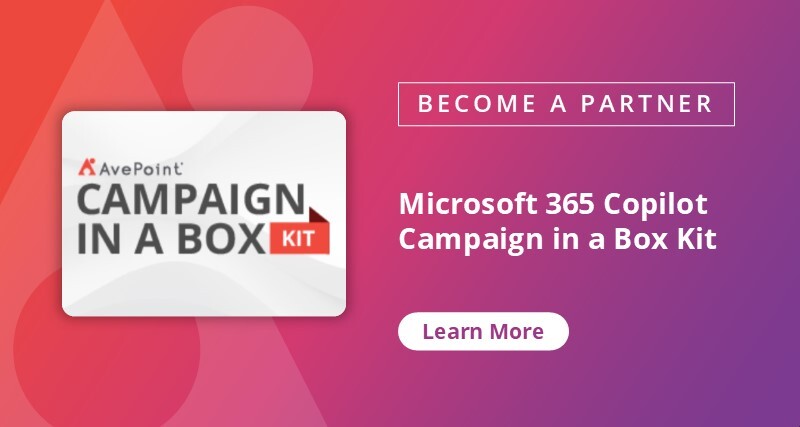Thanks to Microsoft’s recent decision to remove the seat minimum for Microsoft 365 Copilot, the game-changing AI solution for the modern workplace is now accessible to businesses of any size. This presents a unique opportunity for managed services providers (MSPs) to help small businesses leverage the transformative power of AI and implement this AI-powered tool.
Not only is the opportunity there, but so is the market. Early users reported remarkable benefits such as enhanced productivity (70%) and quality of work (68%). Microsoft 365 Copilot is quickly becoming a must-have for businesses. In fact, Copilot made early adopters love using it so much that 77% of them didn’t want to give it up.
By offering new services around Copilot preparation, implementation, and management, MSPs can build out a new business service and increase their revenue streams. In this article, we’ll explore how MSPs can help customers prepare for Copilot and provide support and guidance for successful implementation.
New Revenue Stream for MSPs: How to Build a Service Around Microsoft 365 Copilot
As an MSP, you’re always looking for ways to expand your business and bring more value to your clients. It’s clear that Copilot might be your next big thing, but where do you start? Let’s discuss how to dive in with a new Microsoft 365 Copilot business.
Help Clients See the Real Value of Copilot for Their Business
Many businesses may not be aware of the full potential that Microsoft 365 Copilot offers. While this may seem unbelievable in our world – it’s nearly impossible to go on social media or the news and not see something about Copilot – your clients may not have heard all the buzz about this new AI option. Even if they are familiar with it, they might see it through the lens of healthy skepticism and wonder if Copilot can really do all it says it can.
Take the time to educate your clients on how Copilot can help their business. Brainstorm specific use cases for their industry to help ground the benefits in their reality. You can also check out Microsoft’s materials for inspiration.
Need help getting started? AvePoint has a great Copilot for Microsoft 101 webinar that can help kickstart your conversations.

Offer Training and Support on How to Use Copilot Effectively
Remember what it was like getting your clients up and running on Microsoft 365 for the first time? Or maybe that’s still a regular part of your business? Either way, there’s a lot of training and support needed to get users comfortable with new technology.
Microsoft 365 Copilot is no different. Some clients may be hesitant to take the plunge due to the amount of work involved. That’s why, once you’ve helped clients see that Microsoft 365 Copilot is what their business needs, you’ll need to have a comprehensive training plan – including integrations and walkthroughs for top capabilities – to make sure they maximize the tool. Remember: if they aren’t comfortable with it, they won’t use it, and if they don’t use it, they won’t see the value of Microsoft 365 Copilot.
To help them see progress, analytics tools like AvePoint tyGraph provide comprehensive insights into Microsoft 365 data, which is crucial for Copilot implementation.
This is also a great time to offer customization services to adapt the platform to your customers’ preferences, creating custom commands, templates, and scenarios to help improve their Copilot experience.
Prepare Clients’ Microsoft 365 Environment for Copilot
The beauty of Microsoft 365 Copilot is that it trains on the clients’ data, allowing it to provide insights and recommendations that are tailored to the unique needs and challenges of their business. However, this can also be its downfall if the proper precautions are not in place, posing serious risks like poor output quality, data exposures, or even security concerns.
That’s where you come in. MSPs can set their customers up for success by helping clients use Copilot safely and securely. Start by cleaning up their data and reviewing their security and risk profiles to ensure the AI model is trained on the best data and that its use won’t compromise data security.
Then, develop a framework of processes and policies that enforce necessary conditions and safe use of AI to ensure clients can use Copilot effectively and efficiently in the long term. We’ll go into more detail on the essential steps to set your customers up for secure and sustainable adoption in the next section.
How to Set Clients Up for a Secure Adoption of Microsoft 365 Copilot
Deriving insights from our conversations with enterprise clients and MSPs, AvePoint devised this approach for MSPs to assist customers as they deploy Microsoft 365 Copilot.
Lay the Foundation
A sound data strategy is the foundation of AI success. First, it is crucial to migrate all data across various platforms to Microsoft 365 and Microsoft Graph, so Copilot gains access to all relevant and necessary data to produce quality output. This vital step is a pre-requisite to the next one: preparing your customer’s data.
Microsoft 365 Copilot works best when it uses high-quality data, which means that data needs to be clean and organized for Copilot to produce relevant results. Start by discovering and analyzing their data types and organization.
AvePoint Opus is an information management solution that lets you see your entire data landscape to help you understand how to enhance it. AvePoint Opus’s Intelligent Discovery and Analysis for Microsoft 365 identifies redundant, obsolete, or underutilized data so you can make informed decisions about archiving, deletion, and setting appropriate lifecycle policies; doing so helps ensure accurate and relevant AI results. Remember, the success of your clients’ AI initiatives relies on the quality of the data they use, so this is an essential component of your AI readiness strategy.
Ensure Data Security
Once you have a sound data strategy in place, the next step is to ensure your clients’ data security. Shockingly, nearly half of SMBs (49%) admit they haven’t invested much in data security, yet Microsoft 365 Copilot requires proper security and permission measures to prevent unauthorized access to sensitive corporate information. Otherwise, it may inadvertently expose confidential or proprietary data to unauthorized users.
To prevent this, you need to know where the risks are in your clients’ environments. Identify risky behavior like oversharing or exposing sensitive information such as personally identifiable information (PII), financial or regulated data, or anonymous links. Then, clean up permissions to mitigate any risk and enforce policies to prevent the recurrence of the behavior.
AvePoint Insights can help streamline this otherwise manual security review, giving MSPs visibility of their customers’ access controls and sharing behavior across Microsoft 365. AvePoint insights also provides automated reporting for IT in at-a-glance dashboards and flags any irregular or suspicious activity so you can easily adjust your security measures and promptly respond to potential threats.
AvePoint Insights can uncover alarming details about the customer’s Microsoft 365 environment. For instance, MSP Custom365 discovered with Insights reports that a client had over 35,000 anonymously shared links in a single Microsoft 365 tenant. Read more.

Create the Necessary Safeguards
After cleaning up customers’ data and enforcing security measures, it is crucial to maintain it to ensure clients get the best output and long-term use of Microsoft 365 Copilot. However, as an MSP, manually checking in on each client’s tenant daily is simply not feasible, so automating these safeguards is necessary to ensure systems keep operating as they should.
This can include setting up alerts for potential issues and regularly reviewing system configurations (AvePoint insights can help!), as well as managing workspace lifecycles. In Microsoft 365, workspaces like SharePoint sites and Teams channels are where work gets done. By maintaining tight control over access to these workspaces and disposing of them once they are no longer active and relevant, you can stay on top of your clients’ data and security more easily.
Using AvePoint Cloud Governance, MSPs can automate workspace management to prevent sprawl and access risks. By triggering deprovisioning for idle or unnecessary workspaces based on user inactivity or time frame, Cloud Governance automatically archives or deletes workspaces, reducing the amount of outdated or irrelevant data in your clients’ tenants. Cloud Governance also enables automated workspace recertification, requiring owners to regularly verify their workspace settings and ensure that the workspaces themselves are still necessary.
Using AvePoint Opus, MSPs can further simplify data management with easy retention rules to better discern what content to keep, remove, and archive.
By automating these processes, MSPs can save time and resources while ensuring the long-term success of Copilot for their customers.
Check out this blog post to learn more about the three-step approach to achieve a secure adoption of Microsoft 365 Copilot.
Get Started: Enable Your Clients to Become AI-Powered
According to recent research, more than half of small business owners (56%) believe their business could benefit from AI solutions to improve efficiency and streamline operations. By offering services for the preparation, implementation, and management of Microsoft 365 Copilot, MSPs can play an important role for these small business owners, helping them innovate and drive growth by alleviating any hassle or complexity.
Partner with AvePoint to help your customers embrace Microsoft 365 Copilot. Leverage our Copilot readiness solutions and exclusive go-to-market toolkit to launch your new service faster.
Learn more about the Copilot for Microsoft 365 Campaign in a Box kit.


